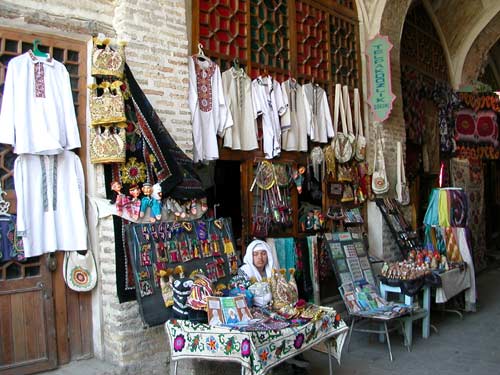Handicraft legacy of Bukhara

Bukhara has been the main spiritual, cultural and economic center of Central Asia from ancient time. Gold-embroidery, silk-weaving and jewelry traditions are on-going here. Woodworkers, blacksmiths and engravers still keep secrets, handing them down from generation to another one.
For instance, lawhs (folding supports for folios) are made of entire piece of oak-tree or nut-tree, at the same time they represent a kind of single unfolding construction. The technology of this wood-work was considered to be irrevocably lost. However, a Bukhara craftsman Rahmon Huseinov did not lose his hopes, at least found detailed description of this technology in an old book. He tried to use it and his attempt was quite successful. Lawhs are highly demanded. Rahmon had to take some apprentices. People usually buy these graceful and expensive supports not for ordinary books but Holy Quran and Hadiths.

In old Bukhara more new workshops are opened today; engravers, gold-embroiderers and furriers sell their goods in the streets.
Shakir Kamalov is a blacksmith of sixth generation. Farmers, carpenters, engravers and butchers come to his workshop to learn smith secrets. Certainly, one can buy things they need in any shop but a real master, Usto, do not use mass consumption goods and order a convenient instrument.
According to the workshop charter, a young boy who is a member of master’s family does not need to observe the devotion ritual. Future blacksmith are trained from their early childhood. Firstly, they do ordinary things. Gradually their tasks become more difficult, and when the teenager is about 15 years old, he works equally with adult blacksmiths. “He who is fond of blacksmith must know that this handicraft is the holiest one and have a professional approach to his work. Our charter states strict observation of smith rules”.

At the same time, the level of master’s skills is determined only by obeying strictly the smith rules because a real blacksmith always has a secret that makes his goods original. Usto Shakir is one of them. Knives with his label are popular in Khiva, Samarkand and Tashkent and across the country. Special sharpening method is of great importance here, believes Shakir Kamilov. Every handicraft in Uzbekistan has its “pir” (sacred patron) who is the founder of certain profession. Woodworkers’ patron is the Prophet Noah, weavers; the Prophet Enoch and blacksmiths; King David. An old legend runs that Allah gifted King David an ability of smelting iron in his palm for his just and fair reign.
Ilkhom Babaev
https://ut.uz/